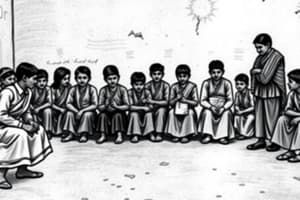Podcast
Questions and Answers
What was the primary aim of the British East India Company's educational reforms in India?
What was the primary aim of the British East India Company's educational reforms in India?
To create a well-educated workforce and administrators to assist in governance.
How did the Anglicization of Education affect traditional Indian education?
How did the Anglicization of Education affect traditional Indian education?
It prioritized Western knowledge and culture, undermining and disregarding traditional Indian educational systems.
Identify two important educational institutions established during the British East India Company's rule.
Identify two important educational institutions established during the British East India Company's rule.
Fort William College (1800) and Elphinstone College (1856).
What was the significance of Macaulay's Minute in the context of Indian education?
What was the significance of Macaulay's Minute in the context of Indian education?
How did British educational policies contribute to the rise of a new social class in India?
How did British educational policies contribute to the rise of a new social class in India?
What were some criticisms of the British educational policy in India?
What were some criticisms of the British educational policy in India?
In what ways did the educational reforms of the British East India Company set the foundation for modern education in India?
In what ways did the educational reforms of the British East India Company set the foundation for modern education in India?
What role did education play in fostering political awareness among Indians during the British rule?
What role did education play in fostering political awareness among Indians during the British rule?
Flashcards are hidden until you start studying
Study Notes
Modern Educational Policy of British East India Company
-
Background Context
- The British East India Company established control over India in the 18th and 19th centuries.
- The desire for a well-educated workforce and administrators led to significant changes in the education system.
-
Key Policies and Changes
- Anglicization of Education:
- Introduction of English as the medium of instruction.
- Focused on Western knowledge and culture over traditional Indian education.
- Establishment of Schools and Colleges:
- Founding of institutions like Fort William College in 1800 and Elphinstone College in 1856.
- Promoted subjects such as science, literature, and law.
- Promotion of English Language:
- English became the language of administration and higher education.
- Shift away from Persian and local languages in official and educational contexts.
- Anglicization of Education:
-
Key Figures
- Lord Thomas Bentinck:
- Advocated for educational reform; supported English education.
- Macaulay's Minute (1835):
- Emphasized the need for English education to create a class of educated Indians who could assist in administration.
- Lord Thomas Bentinck:
-
Impact on Indian Society
- Emergence of New Social Classes:
- Created an educated middle class that would later play a key role in the Indian independence movement.
- Cultural and Intellectual Awakening:
- Fostered a sense of social reform and nationalism among educated Indians.
- Resistance to Colonial Rule:
- Education became a tool for political awareness and activism against British rule.
- Emergence of New Social Classes:
-
Criticism of British Educational Policy
- Neglect of Indigenous Education:
- Traditional Indian education systems were undermined and disregarded.
- Focus on Utility:
- Education was tailored to serve colonial interests, lacking emphasis on holistic development.
- Neglect of Indigenous Education:
-
Long-term Effects
- Set the foundation for modern educational systems in India.
- Influenced post-independence education reforms and policies, emphasizing inclusivity and cultural heritage.
Background Context
- British East India Company controlled India during the 18th and 19th centuries.
- Aimed to create a skilled workforce and administrators through educational reforms.
Key Policies and Changes
-
Anglicization of Education:
- Implemented English as the primary language of instruction.
- Prioritized Western knowledge and culture, diminishing traditional Indian education.
-
Establishment of Schools and Colleges:
- Founded institutions such as Fort William College (1800) and Elphinstone College (1856).
- Emphasized modern subjects, including science, literature, and law.
-
Promotion of English Language:
- English became the dominant language for administration and higher education.
- Led to a decline of Persian and local languages in official and educational settings.
Key Figures
-
Lord Thomas Bentinck:
- Advocated for reforms in the educational landscape, supporting the spread of English education.
-
Macaulay's Minute (1835):
- Stressed the importance of English education to cultivate a class of educated Indians for administrative roles.
Impact on Indian Society
-
Emergence of New Social Classes:
- Created a literate middle class that significantly contributed to the Indian independence movement.
-
Cultural and Intellectual Awakening:
- Encouraged social reform and fostered a national identity among educated Indians.
-
Resistance to Colonial Rule:
- Education became influential in developing political consciousness and activism against colonial authority.
Criticism of British Educational Policy
-
Neglect of Indigenous Education:
- Traditional Indian educational systems were marginalized and undervalued.
-
Focus on Utility:
- Education was designed primarily to fulfill colonial needs, neglecting comprehensive development.
Long-term Effects
- Laid the groundwork for modern education systems in India.
- Influenced education reforms post-independence, emphasizing cultural inclusivity and heritage.
Studying That Suits You
Use AI to generate personalized quizzes and flashcards to suit your learning preferences.




